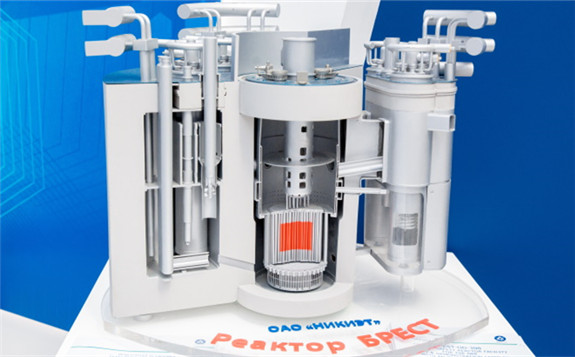A licence has been issued by the Russian nuclear regulator Rostechnadzor to the Siberian Chemical Combine for the construction of the BREST-OD-300 reactor at its site in Seversk, Russia. It will be the world's first experimental demonstration power unit featuring a lead-cooled fast neutron reactor.

The construction licence was signed yesterday by Rostechnadzor Chairman Alexey Aleshin.
During the safety review for the pilot demonstration power unit, new federal regulations and rules were developed, taking into account the specifics of the project. These include regulations for the design and safe operation of reactors using lead as a coolant, as well as requirements for justifying the strength of the reactor vessel, equipment and pipelines of such reactors. A total of 16 Rosatom standards were approved and put into effect, detailing the requirements and ensuring that all the features of the BREST-OD-300 power unit are taken into account.
The Siberian Chemical Combine is a subsidiary of TVEL, the nuclear fuel manufacturing subsidiary of Russian state nuclear corporation Rosatom.
"First of all, I would like to congratulate the entire industry on this important event, towards which we have proceeded progressively and systematically," said Vyacheslav Pershukov, Rosatom's special representative for international and scientific projects. "Obtaining a licence means that all the questions asked by Rostechnadzor have been answered for the BREST power unit construction project. Which, in turn, suggests that all the key project results planned for 2021 will be implemented in accordance with the comprehensive Russian Technology Transfer Network programme."
BREST-OD-300 is part of Rosatom's 'Proryv', or Breakthrough, project to enable a closed nuclear fuel cycle. The 300 MWe unit will be the main facility of the Pilot Demonstration Energy Complex (PDEC), which is in the process of construction at the Siberian Chemical Plant site. In addition, the PDEC will demonstrate an on-site closed nuclear fuel cycle with a facility for the fabrication/re-fabrication of mixed uranium-plutonium nitride nuclear fuel, as well as a used fuel reprocessing facility.
Under a RUB26.3 billion (USD360 million) contract signed in December 2019, Titan-2 will build the reactor building, turbine hall and related infrastructure facilities for the power unit, with completion scheduled before the end of 2026.
Titan-2 Holding, a Russian group of engineering companies, is the general contractor for construction of new nuclear power units at the Leningrad nuclear power plant in Russia, and its subsidiaries are also engaged in the Hanhikivi and Akkuyu nuclear power plant construction projects in Finland and Turkey, respectively.